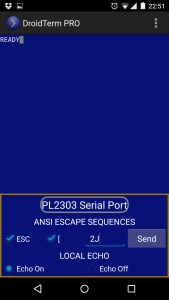Last information about the current state of DroidTerm. Please check it out
I uploaded a new version of DroidTerm some days ago with some changes I would like to share with you. First of all, I decided to drop Bluetooth SPP (Serial Port Profile) support from DroidTerm. I did not consider it my first goal when I started to develop my app. I was struggling to find a great replacement in Android for Putty as a serial terminal so that became my first objective and, eventually, I decided to add support of Bluetooth SPP because it would be a not difficult task. Months later I spent hours refining the USB serial interface of DroidTerm adding devices, fixing bugs… so now It is pretty stable. Unfortunately I almost forgot completely about bluetooth. So it was not so stable at all and I have decide to focus on USB stuff.
Now the good things! You can generate logs of your sessions and keep them for further study. Saving a log of your session is easy:
– Connect your USB-Serial device and configure it as you want.
– Press options button whenever you want.

– Select “Save Log” and your session will be saved in a folder called DroidTerm in your SD card. Files follow this name convention:
YYYY_MM_DD__HH__MM_SS.txt
The text files generated by DroidTerm save not only raw data (Text or Hex representation as We will see next) but metadata of session too.
#Date: 2014/08/06 13:58:19
#Device Name: FT232 USB-Serial (UART) IC
#Baud rate: 9600
#Data bits: 8
#Stop bits: 1
#Parity: None
#Flow: None
0x6C 0x6B 0x6B 0x6C 0x6B 0x6B 0x6C 0x6A 0x64 0x64 0x61 0x61 0x61 0x61 0x41 0x41 0x41 0x41 0x41 0x41 0x41 0x41 0x41 0x41 0x41 0x41 0x41 0x41 0x41 0x41 0x41 0x41 0x41 0x41 0x41 0x41 0x41 0x41 0x20 0x4D 0x65 0x20 0x6C 0x6C 0x61 0x6D 0x6F 0x20 0x46 0x65 0x6C 0x69 0x70 0x65 0x20 0x79 0x20 0x65 0x6F 0x73 0x20 0x66 0x69 0x66 0x6A 0x64 0x6E 0x20
The next improvement, as you may noticed before, is a Hexadecimal representation of received data. I missed that really useful feature when you are debugging, or gaining understanding of a protocol and you need the raw data.
Here an example received from a scrollable LED with String representation:

Obviously except first bytes information is not encoded at all. So Hex mode is necessary to study how this scrollable Led communicates with host:

I have more improvements in mind but They will have to wait for a next release.
Happy craft!






